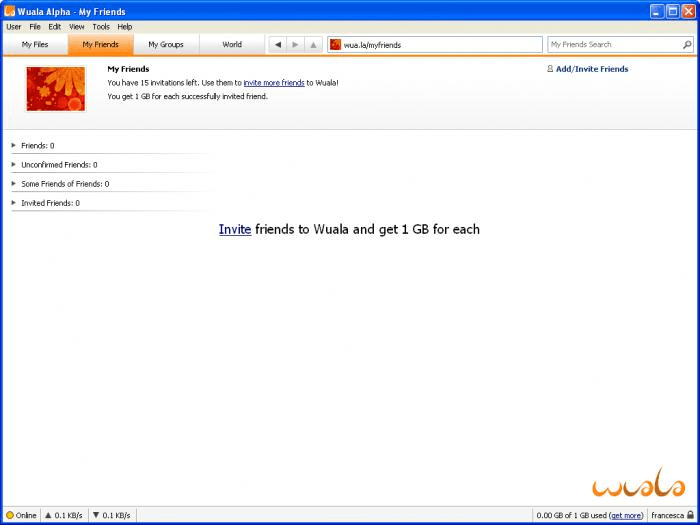

Wuala’s interface is clearly designed by people from the land of Ikea. When I changed this to another drive letter and rebooted the computer, all was well.
#Wuala news windows#
I initially had trouble accessing the drive on Windows because the client wasn’t smart enough to know I already had a W: drive mounted. Windows does not have such a requirement, because its Wuala installer includes a package called Dokan to mount a network drive with the same information. But you can still fully use the client even without MacFuse. MacOS installations recommend the installation of MacFuse so that the Wuala drive shows up in Finder. Installation was straightforward on both Windows and MacOS. Wuala has a great FAQ section that answered all of my storage trading questions. There are also potential legal ramifications to sharing, which I’ll describe in a bit.

This makes it very important that you properly manage Wuala’s bandwidth limiters, especially in Canada where many providers have been forced by Bell to drop their bandwidth caps to 25 GB per month. Trading also gets interesting as ISPs continue to try to impose harsher bandwidth caps. Overall, for those of us with home file servers that have unused space, this might be a great way to get cloud storage for fairly cheap. Wuala will not immediately delete your files however, and you have the opportunity to contact them and inform them of the downtime. You will probably lose most, if not all of your traded storage. Say you go on vacation and shut down your computer(s) for a few weeks. Since you have to be online a certain amount of time, there are ramifications if you go offline. You can trade as little or as much as you like, but are limited to a maximum of 100GB per computer. Trading presents an interesting option for many users. Trading requires your computer be available at least four hours a day. The exact amount of storage is determined by how often your computer is accessible (meaning Wuala’s client is running and online). By allocating storage on your local machine, you get up to that much storage on Wuala’s cloud. Sure enough, it’s basically Buddy Backup with a twist. I had a strange feeling of déjà vu here. The other way to “Go Pro†is through “trading†storage.
#Wuala news free#
Free and paid accounts get access to all features including Automatic Sync, File Revisions and Backup There’s also a feature called “Time Travel†that is unexplained on the main site.

, which do not get Automatic Sync, File Revisions, or Backup. Everyone starts off with a 1 GB Free Account. Wuala offers some interesting account concepts. However, the team from Zurich appears to have been mostly left intact, so Wuala works fairly flawlessly. And SmallNetBuilder readers know that LaCie NAS products can be hit or miss. My experience with storage providers providing online storage has been a little rough, to say the least. I was originally a little dubious of Wuala. Since it’s Java-based, Wuala is cross platform with equal Windows, Mac, and Linux support. But now offers itself as both web and stand alone apps. It was originally designed to run in a web browser as a Java applet. Wuala got its start as a project by a group of students at Switzerland’s Swiss Federal Institue of Technology. Wuala came from a merger between LaCie and Wuala’s creator, Caleido AG. Wuala is LaCie’s entry in the cloud backup and storage markets. Updated 3/16/10: Wuala has added an iPhone application so your files can now be accessed remotely.


 0 kommentar(er)
0 kommentar(er)
